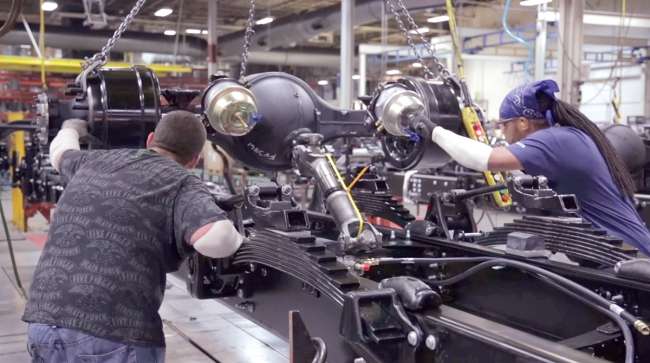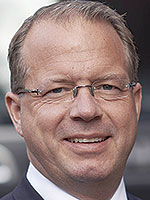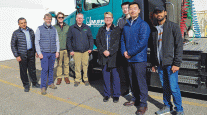Senior Reporter
Class 8 Orders Still Rising 12 Months After Initial Surge Began

North American orders of Class 8 vehicles in October reached 43,600 and extended the cycle of strong demand that began a year ago, ACT Research Co. reported.
October orders marked an increase of 21% compared with 36,033 a year earlier, according to ACT, which cited preliminary data it will update later this month when truck makers release final data. Orders in 2017 were in the mid- to high teens or low 20,000 range before they took off that October.
“In all likelihood, we are going to have close to 300,000 units in backlog in October [once the net orders are known] — certainly an all-time record number no matter what earlier cycle you look back to,” ACT Vice President Steve Tam told Transport Topics.
“We have had a pull-forward in demand, as one would expect. The economy is doing well, freight is doing well, truckers’ profitability has improved,” he said.
The research firm FTR pegged the orders at 43,000, and reported fleets continue to order trucks to secure the remaining build slots in the second half of 2019.
A slowdown is coming, though, said Don Ake, vice president of commercial vehicles at FTR.
“Production rates will exceed 30,000 [a month] soon, but orders will drop below 30,000, maybe, soon,” he said. “I think there is a good chance that October’s backlog will be peak backlog for this cycle.”
One truck maker saw orders drop off in October, others had orders stay about the same and one posted orders stronger than expected, Ake said, but declined to identify them.
FTR has forecast production of 325,000 units this year, rising to 340,000 to 350,000 in 2019.
In the meantime, top executives at truck makers are focused on the order books and the supply chain, which has performed better of late.

Nielsen
“Definitely, the market is a lot stronger than we ever expected it to be,” Daimler Trucks North America President Roger Nielsen said Oct. 29 at a media roundtable.
“We have had a lot of lingering effects from the instability of the supply chain. That has hounded us all year,” Nielsen said.
But the supply chain has stabilized over the last two or three months, and DTNA’s factories are keeping up with demand, he said.
DTNA, the parent company of the Freightliner and Western Star brands, had a leading 38.6% share of the Class 8 U.S. retail sales market through September, according to WardsAuto.com. When asked if he felt that the torrent of truck orders included speculative orders that posed the risk of being canceled, Nielsen said: “I don’t think it is good for the industry to take on speculative orders. It sends the wrong signals to everybody, be it the supply chain or customers.”
Ordering with DTNA involves more than just a customer pulling out a price book and choosing features, he said. “It’s always a discussion. So we always know in the process of selling trucks where we are in the negotiations [for orders]. Right now, we are seeing the market is strong going into 2019.”

Lundstedt
Martin Lundstedt, CEO of Volvo AB, said large fleets want to know there will be production capacity available to them beyond their baseline order.
Volvo is the second-largest commercial vehicle manufacturer in the world. Its brands include Mack Trucks and Volvo Trucks North America.
“We are working with them so we can distribute that [demand] over the year, going through [the order books] month by month, both for Volvo and Mack,” he said in a quarterly earnings call in October.
VTNA and Mack combined for an 18.2% Class 8 share through September.
Paccar Inc. reported its backlog is already extending into the second half of 2019.
In the past, a surge in orders like this “was often driven by a pre-buy related to an emissions change,” Paccar President Harrie Schippers said during the company’s earnings call in October.
But not this time.
“Customers across all segments are experiencing strong demand from growing freight volume, very high fleet utilization and strong pricing,” he said.
Additionally, Paccar has put cancellation fees in place for dealers, Schippers said. “We feel clearly confident that dealers will only put in those orders that they really need.”
Paccar is the parent of Kenworth Truck Co. and Peterbilt Motors Co., which combined for a 29.6% Class 8 share through the first nine months of the year.
Meanwhile, ACT expects to see order activity in the next one to two quarters to revert to replacement-type demand. “Think 20,000 as opposed to 40,000,” Tam said.
Ake suggested that November and December could be the low-order months of the year, when, typically, they are among the very highest.
“It’s been an extraordinary order year,” he said.



